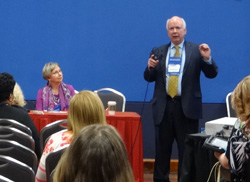Note: Richard Long, IRA’s Director of Governmental Relations, is resigning from IRA after 35 years of service to the Association to take up new challenges, including consulting in the education policy space and teaching an online course. On this occasion, Reading Today invited Rich to share a look back at the major education policy milestones that occurred during his time here. What follows is his farewell reflection.
 When I joined IRA’s staff in 1977 I had little idea that I would be part of the organization for 35 years, bear witness to some fascinating events, meet some insightful researchers, teachers and leaders and every now and again influence some of those events.
When I joined IRA’s staff in 1977 I had little idea that I would be part of the organization for 35 years, bear witness to some fascinating events, meet some insightful researchers, teachers and leaders and every now and again influence some of those events.
The contrast between then and now is striking. IRA had just gone through a period of explosive growth in membership with the passage of the Elementary and Secondary Education Act which pumped a large part of almost $1 billion into the recruitment of reading specialists (of which there were very few).
My hiring came after the passage of the Education for All the Handicapped Act in 1974 and with it the federal definition of learning disabilities, in which IRA felt that it had been left out of the conversation. In contrast, by 2014 the issues themselves had multiplied, and complexity of those issues is as much a part of the education policy debate as it is a debate over what level of government should be doing what.
The “Prayer Breakfast”
One of my early tasks was to bring together many parts of the government who were working on reading policy. This was done with the creation of the “prayer breakfast.” It was held at the Holiday Inn across from what is now the U.S. Department of Education. In that group were staff members from the reading research team of the National Institute of Education, the Right to Read Office/Office of Basic Skills, and Title I, as well as several program officers focused on reading.
 Richard Long speaking at International
Richard Long speaking at International
Literacy Day in 2013
During those breakfasts we would talk about what was going on and what needed to be done, and then find ways of sharing what could be shared to move an agenda of improvement forward. (I can talk about this now, as I am the last person still working who was in that group.) It was a great boon to me as I was able to learn about the integrities of the government, what was working and what needed more funds, and then share (some) of that information with staff members and Members of Congress.
Creation of the Department of Education
One of my first big roles was working on creating the cabinet level Department of Education. The coalition that created that agency was complex, with money coming in to hire high-level talent, support a public relations campaign, and collect information. It was fun stuff, with meetings at the White House and on the Hill, always talking and moving information on who was voting for and who was voting against. It was also fun when we won the right to have the IRA President at the White House with the then Executive Director Ralph Staiger. A picture of that event is hanging on the wall in Headquarters.
Education for All
During the 1980s adult literacy was a hot issue. Monthly meetings were held with Mrs. Barbara Bush to focus the government on helping the millions of adults who didn’t have the reading skills needed to succeed. IRA membership in the National Coalition for Literacy was a key component of this push that resulted in the passage of the National Literacy Act. This took six years of intensive work but resulted in my being one of 25 people who witnessed the President’s signing of this Act.
Barbara Bush and Adult Literacy
A unique opportunity came my way with the U.S.’s effort to become part of the Education for All movement in 1988. A group was called together to chart the North American regional consultation for this movement and I was selected as its chair. As a result I was meeting with the heads of UNESCO, UNDP, UNICEF, and leaders from US AID as well as several Canadian agencies. Out of these efforts came a set of policies and initiatives.
 Richard Long at International Literacy
Richard Long at International Literacy
Day in 2013
A small but important initiative was created when IRA decided to ask the question, “Who is teaching our children?” and sought to change the practice of having paraprofessionals teach many of our disadvantaged youth. With a combined targeted public relations and legislative campaign, IRA was able to secure the requirement that professional teachers teach our neediest children and for the paraprofessionals to have access to the education and training they needed.
The IRA-NCTE Standards
A difficult period occurred when the IRA and NCTE released their standards for the English Language Arts/Reading in 1996. This development was part of the push for disciplinary standards that came out of the reform movement initiated by the nation’s governors and then President George H. W. Bush in Williamsburg. Implementing this agenda fell to the Clinton Administration. Unfortunately the standards developed by the two associations were not what the government wanted.
The IRA-NCTE Standards focused on what we wanted students to be able to do with respect to thinking and the use of language arts, not grade by grade goals. I was told in no uncertain terms by senior leaders that they felt let down by the recommendations. Frustration was voiced in a Washington Post editorial where I was criticized by name. Ironically, these standards were later used by some states to develop their own standards.
The focus on reading and achievement continued to be in the forefront of federal thinking and a large reading program was passed in 1997, the Reading Excellence Act. This Act contained language that defined both reading and reading research. Many in the field believed that this approach of having federal definitions was the wrong way to go. But what isn’t widely known is that the IRA leadership signed off on the definition, when the Senate education staff asked for comments.
 Richard Long presenting a session at
Richard Long presenting a session at
the IRA Annual Conference What happened afterward was amazing: three years later, when Reading First passed, the earlier Act’s definition of reading research was then interpreted as meaning that all of the conditions it specified needed to be met, not any conditions individually. So, for example, a study published in a peer-reviewed journal would constitute only one element of an acceptable evidence base. Other conditions, including a requirement that the study be an experimental study, now also needed to be met. Even those who drafted this interpretation know that the pool of usable knowledge was made too restrictive, but they wanted to create a push to use what was known. This was a big difference and has caused over a decade’s worth of controversy.
Response to Intervention (RTI)
But there have been other controversies in the reading education policy field. Some involved things like the creation of the Response to Intervention (RTI) program. IRA had been pushing to move away from the deficit model for identifying those students with a learning disability as well as to make a greater use of the reading specialist to provide help for those students. However, by the time this idea began to take hold, the changes in schools had seen a shift from the hiring of reading professionals in most Title I schools and many others to having a reading coach or intervention specialist whose job it was to improve the instructional knowledge of the classroom teachers. It became the teacher, not the professional, doing the intervention itself.
The LEARN Act and Beyond
As the Congress reduced the funding for Reading First, investigations into its implementation continued, and it became clear that new legislation was needed. The legal structure needed to reflect what had been learned, not just in Reading Excellence and Reading First but back to the Right to Read program as well. One of the key lessons was that we couldn’t get the results the nation wanted without focusing on access to evidence based practices and it needed to cover the entire age spectrum.
The LEARN Act (Literacy for Every American, Results for the Nation) was written and support secured. But while this program is awaiting the passage of a new Elementary and Secondary Education Act, we were able to secure a pilot program in six states, the Striving Readers Comprehensive Literacy Program, and protect its funding during a time period when funding for education programs aimed at specific areas was basically reduced to almost nothing.
Now we look just over the horizon and the reading field will be facing more challenges as:
- the RTI program moves to its next phase of identification of those with a learning challenges
- new standards are implemented with an emphasis on disciplinary literacy
- demands are made for changing teacher education to both make use of the five reading elements
- early education is expanded into the child care system
In addition, the need to incorporate research based ideas on reading instruction into the next phase of school reform remains. There are tough challenges ahead, and as long as IRA is engaged in finding answers the future will be as rich as the past.
Richard Long’s final day as the International Reading Association’s Director of Government Relations is January 31, 2014.